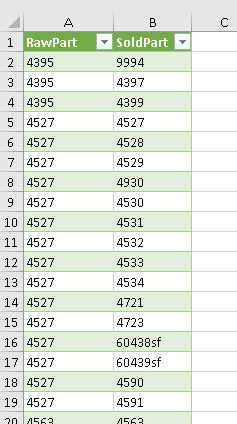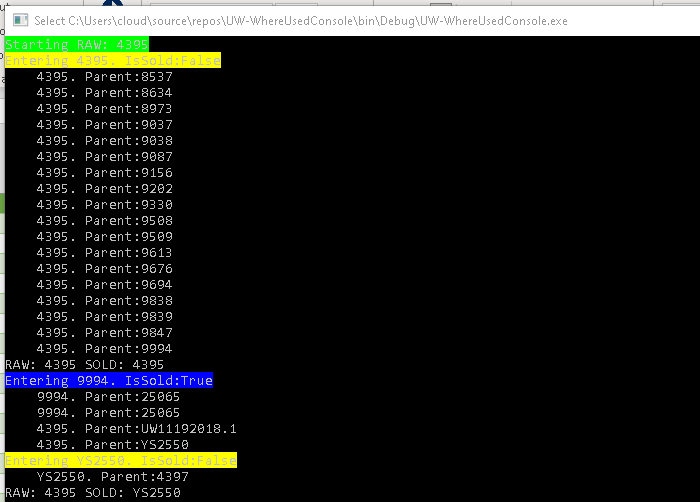Here’s a really dumb and lazy way to do it. There are definitely improvements to be had, but it met my needs so I figured I’d share. It works off a fixed rawParts list (parts to analyze) and soldParts list (as this was much more efficient for me to pull it out once.
Crawls up indefinitely. Logs in console in a questionable color scheme. Writes output to file.
using EpicorRestAPI;
using System;
using System.Collections.Generic;
using System.IO;
using System.Linq;
using System.Text;
using System.Threading.Tasks;
namespace UW_WhereUsedConsole
{
class Program
{
static StringBuilder sb = new StringBuilder();
static Dictionary<string, PartInfo> PartInfos = new Dictionary<string, PartInfo>();
//this could easily be queried from REST or BAQ
static List<string> soldParts = new List<string>()
{ "YOURSOLDPARTSHERE","1002","1003","1004","1005","1006","1007","1008","1009","1010","1011","1012","10124","1013","1013FF","1013RP","1014","1019","1027","20GAGALA177","3000","3005","3006","3007","3011","3017","3023"
};
static List<string> rawParts = new List<string>()
{ "YOURRAWPARTSHERE","4395DOT","4527","4527DOT","4563","4563DOT","4577","4749","4749DOT","4777","4777DOT","4791","4791DOT","4809","4809DOT","4822","4822DOT","4832","4832DOT","4838","4838DOT","4851","4851DOT"
};
static List<KeyValuePair<string, string>> AllSoldParts = new List<KeyValuePair<string, string>>();
static void Main(string[] args)
{
InitRest();
DoItGood();
}
static void InitRest()
{
EpicorRest.APIVersion = EpicorRestVersion.V1;
EpicorRest.AppPoolHost = "EPICORSERVER";
EpicorRest.AppPoolInstance = "EpicorInstance";
EpicorRest.UserName = "chrisconn";
EpicorRest.Password = "HahaHasoNotGettingMyPassAgain";
EpicorRest.IgnoreCertErrors = true;
EpicorRest.CallSettings = new CallSettings("UWLVL", "MfgSy", "", "");
EpicorRest.Company = "UWLVL";
}
private static void DoItGood()
{
AllSoldParts.Clear();
sb.Clear();
sb.AppendLine($"RawPart,SoldPart");
foreach (string part in rawParts)
{
Console.BackgroundColor = ConsoleColor.Green;
Console.WriteLine($"Starting RAW: {part}");
PartInfos.Clear();
var rawPart = new RawPart(part);
GoUp(ref rawPart, part);
foreach (string soldPart in rawPart.SoldParts)
{
if (!AllSoldParts.Where(w => w.Key == rawPart.PartNum && w.Value == soldPart).Any())
{
AllSoldParts.Add(new KeyValuePair<string,string>(rawPart.PartNum, soldPart));
}
}
}
//--- all done crawling, sum it up and write it
//sb.AppendLine($"{rawPart.PartNum},{soldPart}");
foreach (KeyValuePair<string, string> sp in AllSoldParts)
{
sb.AppendLine($"{sp.Key},{sp.Value}");
}
var path = "RawPartAnalysis.txt";
File.WriteAllText(path, sb.ToString());
}
private static void GoUp(ref RawPart rawPart, string PartNum)
{
/* if(PartInfos.ContainsKey(PartNum))
{
//already done
return;
}*/
var parameters = new Dictionary<string, string>();
parameters.Add("whereUsedPartNum", $"{PartNum}");
parameters.Add("pageSize", "0");
parameters.Add("absolutePage", "0");
var res = EpicorRest.BoPost("Erp.BO.PartSvc", "GetPartWhereUsed", parameters);
var pwu = res.ResponseData.returnObj.PartWhereUsed;
// if (PartInfos.ContainsKey(PartNum)) return;//we already crawled this guy up, dont do it again
var pi = new PartInfo();
pi.PartNum = PartNum;
pi.Sold = IsSold(PartNum);
if (!PartInfos.ContainsKey(PartNum))
PartInfos.Add(PartNum, pi);
Console.BackgroundColor = pi.Sold ? ConsoleColor.Blue : ConsoleColor.Yellow;
Console.WriteLine($"Entering {PartNum}. IsSold:{pi.Sold}");
if (pi.Sold) rawPart.AddSoldPart(PartNum);
foreach (var pw in pwu)
{
string pwpart = pw.PartNum;
string pwrev = pw.RevisionNum;
Console.ResetColor();
Console.WriteLine($" {PartNum}. Parent:{pwpart}");
// if (!rawPart.IntermediateParts.ContainsKey(pwpart))
{
// rawPart.IntermediateParts.Add(pwpart, pwrev);
var isSold = IsSold(pwpart);
pi.UsedBy.Add(pwpart);
if (isSold)
{
rawPart.AddSoldPart(pwpart);
Console.BackgroundColor = pi.Sold ? ConsoleColor.Blue : ConsoleColor.Black;
Console.WriteLine($"RAW: {rawPart.PartNum} SOLD: {pi.PartNum}");
}
bool up = pw.CanTrackUp;
//dont mind me @Jose, just an infinite loop thats all
if (up) GoUp(ref rawPart, pwpart);
}
}
}
private static bool IsSold(string PartNum)
{
//found it to be much more efficient to query all sold items first and work from memory
var ret = soldParts.Contains(PartNum);
return ret;
}
//represents a part we already crawled up (cause by nature we may encounter again)
//but should we if we are looking at new raw part?
public class PartInfo
{
public string PartNum { get; set; }
public string Rev { get; set; }
public bool Sold { get; set; }
public List<string> UsedBy { get; set; }
public PartInfo()
{
UsedBy = new List<string>();
}
}
//represents lowest level
public class RawPart
{
public string PartNum { get; set; }
public List<string> SoldParts { get; set; }
public Dictionary<string, string> IntermediateParts { get; set; } //part/rev
public RawPart(string partNum)
{
PartNum = partNum;
SoldParts = new List<string>();
IntermediateParts = new Dictionary<string, string>();
}
public void AddSoldPart(string PartNum)
{
if (!SoldParts.Contains(PartNum)) SoldParts.Add(PartNum);
}
}
}
}
Results:


